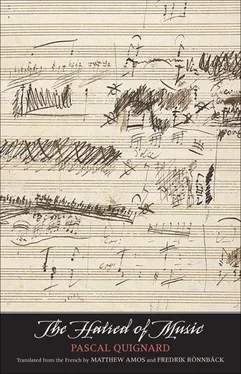— Autar emon kèr èthel’ akouemenai .
Ulysses never said that the Sirens’ song was beautiful. Ulysses — who is the only human to have heard the song that kills without being killed — says, in order to describe the Sirens’ song, that the song “fills the heart with the desire to listen.”

The sounds of the voice draw part of their breath from the air that is accumulated and emitted through respiration. The entire internal “auditorium” and even the future respiratory “theater” emphatically reflect the emotions that the body experiences, the effort it tries to make to expel them or the sensations that animate it. Sounds collaborate with the necessity for air and ventilation that constrain this hollow and skin-covered instrument that we ourselves are. Language is organized around a zoological body that inspires and expires without respite. That “agonizes” without respite. Those who emit sounds divide their respiration in two never completely distinct halves. They give up control of their will to this obsessive, subjugating pulmonation. And — the word psychè in Greek only means breath — with its cries, they build their tone, their timbre, their voice, their cadence, their silence, and their song.
This functional metamorphosis and division are themselves redoubled by a more remarkable characteristic: those who emit a sound hear the sound they emit. (At least after their birth and their exposure to air and breathing. And still they cannot hear it as others perceive it. No more so than those who hear it can perceive it as others produce it.) Ceaselessly this back-and-forth takes place and this game that never ceases to repeat itself allows us to construct pitch, intensity, rhythm, incantation, persuasion, and various rhetorical, which is to say personal, forms of “harrowing” cries, “sullen” moans, “deep” sighs, “hermetic” silences.
Ceaselessly “ear” compares what “mouth” and “throat” have attempted.
The pulmonary “psyche” compares. This is what ties the soul to the wind. And to the aerial, that is the invisible, to sounds, to the celestials, to birds. To Homer’s swallow.
Sound that resonates is thus already the result of a veritable acoustic competition. Every animal species adapted to air is endowed with a hum that allows it to differentiate itself from other species, participating in an acoustic system in which, in order to be associated with its “acoustic family,” it plays the part expected of it only by superimposing and negating the other parts it is capable of hearing. We imitate ourselves imitating. This is not simply childhood. A sort of acoustic conversation, of resound and ceaseless appearance, continuously creates, shapes, and refines each language in its system of voices in the same way that it creates and alerts each sound in the acoustic forest.

Bellowing is the yearning of man’s song. The changing of boys’ voices 12cannot surpass it in its intensity and petrifying violence.
For man, bellowing is the impossible song. It was the identifying song as it is the inimitable song entrusted to the invisible secret of the forest.

The twenty-first can be played on strings — on bows — and on winds — at the tip of flutes. On the harpsichord and the piano, it is never heard. Other than by those who silently read works written for keyboard. And yet the listener believes he hears what is not played.
Only with the eyes do we “hear” the subtonic.
We raise a bit for the eye’s ear what keys cannot produce.
Even for strings, Johann Sebastian Bach liked to write whole and half notes that were linked two strings apart and that could be audible only to the eye.

Unplayable notes, nonacoustic sounds, signs that are written down for the pure beauty of writing.
I propose to call “unheard notes” these written unplayable sounds that bring to mind what grammarians call “ineffable consonants” (the p in sept ). 13

Besides the songs forbidden to man when his voice changes, there are also ineffable vowels. And not only among the gods who reign over the dark clouds and the Sinai and whose consonantal name is murmured with the help of the breeze at the entrance to prehistoric caves.
Still in the forests (the a in daine ). 14

All that the millennia on the Ganges have seen of human history can be captured in a flash at high noon: “All that you have heard resembles the piece the musician plays when his servant has carried his cithara off for repairs and after the mouse has eaten away at his score.”

It is said of certain rains that they hammer. Of others that they drum. Of others that they crackle. These images, apart from the sense of truth they provide, are strictly speaking extraordinary — a drum, a fire, a hammer — for describing rain. Such images lead to the reversal of the comparison at their source.
It was not rain that drummed. It was drumming that called for rain.
It is Thor who holds the hammer.

In the Middle Ages, revenants were in the habit of tapping three times on the window casement or on the door before returning. These sounds revived the hammering of the three nails into the cross. (And they prefigured the three knocks that, at the theater in our days, have come to precede the appearance of colorful and talkative ghosts.)
The dead drum. In Japanese Noh, this drumming reaches a devastating intensity, upon every appearance, that nothing seems capable of equaling.
What I call tarabust is Zeami’s silk-covered drum: this drum awaits a drummer whose love will be so strong that it will make silk resound. Zeami’s drum is an ineffable consonant in Kyoto, in the middle of the fifteenth century.
In a story by Caesar of Heisterbach, dating from the first half of the thirteenth century, a dead father, having taken up the habit of returning frequently to the home of his son, pounded the door so hard ( fortiter pulsans ) that the son complained to his father that his sleep was disturbed even when he did not return.

The first texts written in the history of the world (Sumerian, Egyptian, Chinese, Sanskrit, Hittite literature) are twilit. These songs, these letters, these dialogues, and these stories are all marked by terror and by tragic, moaning reiteration. Tragic in Greek means the breaking, hoarse voice of a slaughtered goat. The despair that carries these most ancient texts is as absolute as the death in their endings and the ruin that seals their fate. Every last one of these texts is haunted by death and by the dead. Is tarabusted.
Every last one of their supposed authors a sort of Job.
Brightness, hope, cheerfulness, only with the arrival of revealed religions and nation-state ideologies do these enchanting silhouettes appear on the horizon: meaning of life, meaning of the earth, escalation of war, progress of history, daybreak, deportation.

Читать дальше













